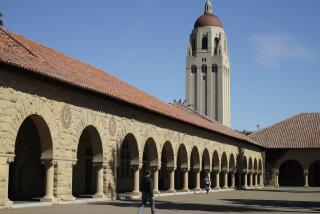Critics call for more oversight of California accreditation panel
In the last year, a little-known panel of educators has been denounced by state lawmakers, sued by San Francisco’s city attorney and faulted by the federal government for violating its own policies.
Critics have called the Accrediting Commission for Community and Junior Colleges tyrannical, vindictive and out of control.
The catalyst was the agency’s move last summer to withdraw accreditation from City College of San Francisco. What is typically a sober administrative process thrust the Novato, Calif.-based panel into the middle of a national debate over whether agencies that are intended to hold colleges and universities to high standards themselves need more oversight.
The accrediting panel has handed out a huge number of sanctions — far more than other regional agencies in the rest of the country. Administrators and faculty up and down the state say the group demands far too much from colleges and relies far too little on students’ academic progress.
In higher education, these agencies wield huge influence: Colleges that lose accreditation can’t offer financial aid, which can ruin a school’s reputation and even cause it to close.
An agency evaluation team found that City College, which enrolls more than 80,000 students, had not done enough to balance its budget to meet the campuses’ financial obligations. The school also was found to be deficient in its administration, staffing and facility repairs, among other things.
But supporters of the college have mounted a counterattack, alleging that the commission’s decision, which could take effect in July, was tainted by conflicts of interest and political bias. The agency’s detractors also contend that it lacks transparency, is arbitrary and has been overly aggressive in sanctioning many of the state’s 112 two-year schools.
College advocates gained the ear of state lawmakers who authorized an audit examining the practices of the accrediting panel. In addition, three lawsuits are pending by faculty unions and San Francisco City Atty. Dennis Herrera, whose civil action alleges that the commission acted to withdraw accreditation “in retaliation for City College having embraced and advocated a different vision for California’s community colleges than the ACCJC itself.”
A San Francisco Superior Court judge earlier this month granted a preliminary injunction, ruling the commission cannot revoke City College’s accreditation until after a trial is held. A trial date has not been set.
“The problem with any institution like the commission is that it’s self-regulated, self-appointed and accountable to no one in how it’s spending its revenues and that’s a recipe for disaster and abuse,” said U.S. Rep. Jackie Speier (D-Hillsborough), who is seeking a meeting with U.S. Secretary of Education Arne Duncan to discuss increased oversight of the commission.
“What I smell is an institution that has driven administrators of community colleges throughout the state to be intimidated and shrink from challenging them for fear of the consequences,” she said.
But agency President Barbara Beno said in an interview that politicians and others with little understanding of the accrediting process are applying unwarranted political pressure to a group that is already being urged by the U.S. Department of Education to ensure that colleges resolve problems quickly. Congress has set a two-year time frame by which schools need to improve or risk losing accreditation.
“The commission has the authority to act as the gatekeeper for federal funds and in order to act as gatekeeper we need to make decisions as the need warrants,” Beno said. “When an institution can’t meet standards in a timely way, however sad, we’re obliged to act. We didn’t make the decision on City College lightly. We’re aware of the potential impact on students and the community, but standards are standards.”
The commission, part of the Western Assn. of Schools and Colleges, is one of seven private regional accrediting groups recognized by the U.S. Department of Education. The California commission is made up of college faculty, administrators and members of the public.
President Obama has proposed an overhaul of the accrediting system nationwide to focus more on graduation rates, retention and affordability, among other measures. Some educators argue that accreditation doesn’t necessarily indicate academic quality and shouldn’t be a condition for federal student aid.
Supporters say City College should not be sanctioned because its academic record, compared with the state’s other two-year schools, is fairly strong. Nearly 56% of students complete a degree or transfer within six years, topping the statewide average of 49%. And 75% of students returned for three consecutive terms compared to the statewide rate of 66%.
The increasing focus by accreditors on college finance and governance rather than student outcomes worries such education experts as David A. Bergeron, a vice president of postsecondary education at the Center for American Progress, a Washington, D.C.-based think tank.
“City College is not doing poorly by their students … so the fact that the accreditors took action to withdraw accreditation is a little concerning,” he said.
Its critics contend that the commission has issued far more sanctions against its 133-member schools in California, Hawaii and the Pacific than handed out by other regional agencies. The agency accounted for 89% of all sanctions nationwide from 2003 to 2008, and 64% from June 2011 to June 2012, according to researchers at the San Mateo Community College District.
San Mateo Chancellor Ron Galatolo is one of the few high-ranking administrators who has been outspoken in his view that the accreditors are too focused on nonacademic standards rather than the quality of teaching and learning.
“I’ve been in the system 27 years and used to go on site visits,” Galatolo said. “Before this body was in place, it was about a transparent peer process, but now it’s guilty until proven innocent.”
His district includes Canada College, College of San Mateo and Skyline College, which all had their accreditation standing reviewed by the commission. Results are expected next month.
Meanwhile, in a December review, federal officials recommended that the accrediting panel maintain its authority, but also identified a number of problems in ensuring that its standards and policies are widely accepted, demonstrating that faculty are represented on its evaluation teams, and providing schools with more clearly written reports on whether they meet standards. These must be corrected within a year.
Beno said her agency is already working to revise the reports given to campuses.
But the federal review found no evidence of attempted interference with City College’s mission or inconsistency in applying standards, as critics contend. And City College Chancellor Arthur Q. Tyler, state-appointed special trustee Robert Agrella and systemwide Chancellor Brice W. Harris have all said resources should be spent on fixing problems rather than criticizing the commission. The college has not joined lawsuits brought by its supporters.
Yet for many community college faculty and staff, the agency’s directives are confusing and can be costly, said Patricia Flores-Charter, a learning disability specialist at Southwestern College in Chula Vista. The college is accredited.
To address one recommendation, the college had to pay the commission $1,500 to review and approve the curriculum of an online degree program.
“I was surprised by the lack of support we received from the accrediting office,” said Flores-Charter, adding that it should “be not just a policing entity but an entity that helped us attain the highest levels of quality.”
Beno said her agency is joining with faculty and staff at colleges statewide to provide information and training on ways to comply with standards so that they maintain accreditation.
She said the agency’s reputation and credibility will withstand the controversy.
“Perhaps our credibility has been hurt in San Francisco,” she said, “but faculty and administrators in other districts have said we understand what happened with City College and the conditions at the time those decisions were made.”
More to Read
Start your day right
Sign up for Essential California for news, features and recommendations from the L.A. Times and beyond in your inbox six days a week.
You may occasionally receive promotional content from the Los Angeles Times.







